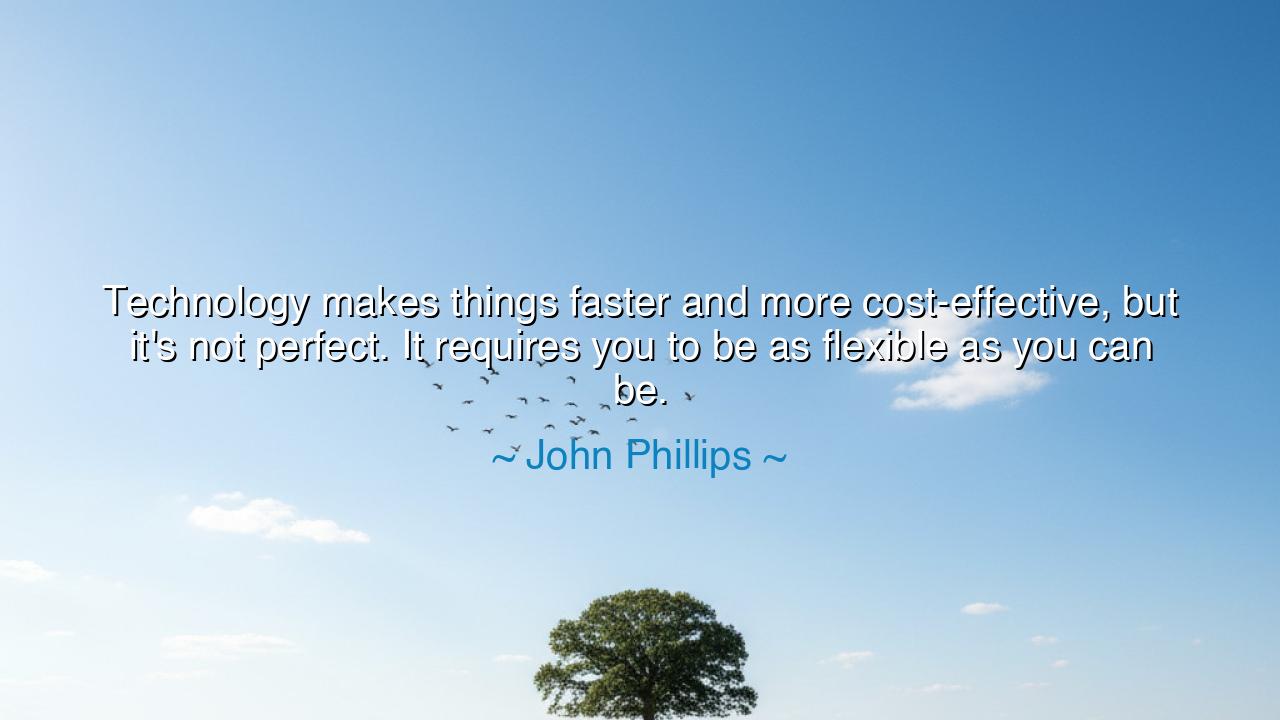
Technology makes things faster and more cost-effective, but it's
Technology makes things faster and more cost-effective, but it's not perfect. It requires you to be as flexible as you can be.






Hear the words of John Phillips, spoken with the wisdom of one who has witnessed both the promise and the peril of progress: “Technology makes things faster and more cost-effective, but it’s not perfect. It requires you to be as flexible as you can be.” Though cast in the language of our modern age, these words carry the ancient rhythm of truth. For tools, no matter how great, are never flawless, and man must learn to bend, to adapt, to rise again when the tool fails, lest he become a slave to what he himself has forged.
The ancients knew this lesson well. When the chariot was first fashioned, it gave speed to armies and traders alike. Yet on muddy roads, the wheel broke; in steep terrain, the chariot faltered. The wise did not abandon the invention, nor did they curse it as a false hope. Instead, they learned flexibility, using horses where wheels failed, building roads where terrain resisted. The tool magnified their power, but only those willing to adapt could truly master it. So it is with technology in every age—it grants speed and efficiency, but demands from us patience, resilience, and flexibility of mind.
Consider the story of the Apollo missions. The spacecraft carried the brilliance of modern technology, but it was not perfect. Circuits failed, alarms rang, and disasters threatened. Apollo 13 in particular became a testament not to the perfection of machines, but to the flexibility of human beings. The astronauts and engineers bent their will to the crisis, improvising solutions, using tools in ways never intended. It was not the flawless design of technology that saved them, but the flexible spirit of those who wielded it. Thus, Phillips’ words resound with proof: without adaptability, even the mightiest machines are but fragile shells.
Technology is a servant, not a master. It grants us the gifts of speed, cost-effectiveness, and reach, but it is never complete. The farmer with a plough must still adapt to weather; the sailor with a compass must still heed the winds; the surgeon with his instruments must still respond to the unpredictability of life. To believe that technology alone can guarantee perfection is to fall into idolatry. True mastery lies not in the tool, but in the wielder’s ability to remain flexible, calm, and creative when the unexpected arrives.
The deeper meaning of Phillips’ teaching is this: progress does not eliminate struggle, it transforms it. Where once men struggled with slowness and scarcity, now they struggle with the limits and failures of complex machines. The wise see this not as betrayal, but as the eternal pattern of life. Every solution gives rise to new challenges. Every leap forward requires greater adaptability. Thus, flexibility becomes the supreme virtue in an age of technology—a virtue greater than knowledge, greater even than speed.
The lesson for us, children of the future, is clear: embrace technology, but do not worship it. Rejoice in its speed, its power, its cost-effectiveness, but hold always in your heart the knowledge that it will falter, and when it does, you must not despair. Train yourself to be adaptable, to shift your path when obstacles arise, to find new ways when old ways collapse. For the strong in this age are not the rigid, but the flexible, those who bend like the reed and yet do not break.
Practical actions lie before you: when you use technology, prepare always for its failure. Cultivate skills that allow you to adapt when the machine errs. Practice creativity in problem-solving, rather than leaning only on the tool. And most of all, nurture patience and calmness in times of disruption. These are the qualities that transform technology from a fragile idol into a true servant of human will.
Thus let the words of John Phillips echo like a guiding flame: “Technology makes things faster and more cost-effective, but it’s not perfect. It requires you to be as flexible as you can be.” Take this teaching into your heart, for it is not only about machines, but about life itself. Nothing is perfect; all things require flexibility. Those who adapt shall endure, and those who endure shall triumph.






AAdministratorAdministrator
Welcome, honored guests. Please leave a comment, we will respond soon